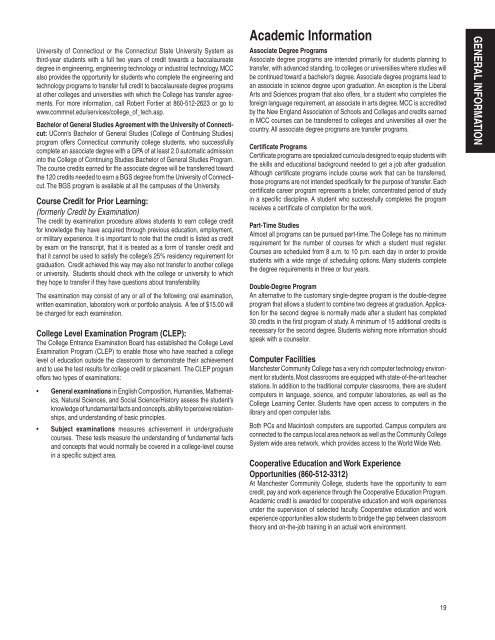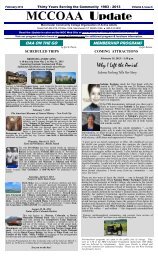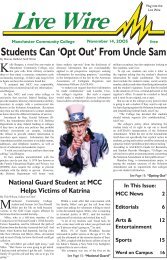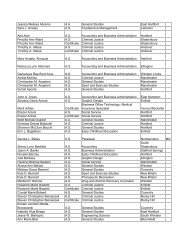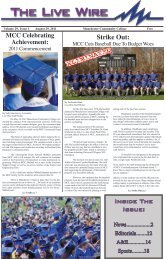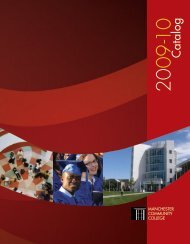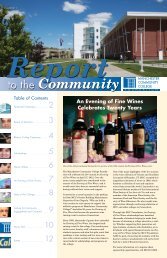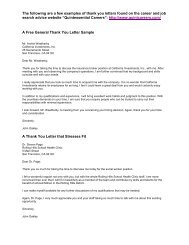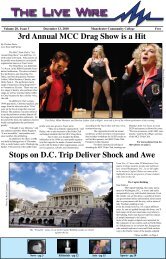Liberal Arts and Science - Manchester Community College ...
Liberal Arts and Science - Manchester Community College ...
Liberal Arts and Science - Manchester Community College ...
You also want an ePaper? Increase the reach of your titles
YUMPU automatically turns print PDFs into web optimized ePapers that Google loves.
University of Connecticut or the Connecticut State University System as<br />
third-year students with a full two years of credit towards a baccalaureate<br />
degree in engineering, engineering technology or industrial technology. MCC<br />
also provides the opportunity for students who complete the engineering <strong>and</strong><br />
technology programs to transfer full credit to baccalaureate degree programs<br />
at other colleges <strong>and</strong> universities with which the <strong>College</strong> has transfer agreements.<br />
For more information, call Robert Fortier at 860-512-2623 or go to<br />
www.commnet.edu/services/college_of_tech.asp.<br />
Bachelor of General Studies Agreement with the University of Connecticut:<br />
UConn’s Bachelor of General Studies (<strong>College</strong> of Continuing Studies)<br />
program offers Connecticut community college students, who successfully<br />
complete an associate degree with a GPA of at least 2.0 automatic admission<br />
into the <strong>College</strong> of Continuing Studies Bachelor of General Studies Program.<br />
The course credits earned for the associate degree will be transferred toward<br />
the 120 credits needed to earn a BGS degree from the University of Connecticut.<br />
The BGS program is available at all the campuses of the University.<br />
Course Credit for Prior Learning:<br />
(formerly Credit by Examination)<br />
The credit by examination procedure allows students to earn college credit<br />
for knowledge they have acquired through previous education, employment,<br />
or military experience. It is important to note that the credit is listed as credit<br />
by exam on the transcript, that it is treated as a form of transfer credit <strong>and</strong><br />
that it cannot be used to satisfy the college’s 25% residency requirement for<br />
graduation. Credit achieved this way may also not transfer to another college<br />
or university. Students should check with the college or university to which<br />
they hope to transfer if they have questions about transferability.<br />
The examination may consist of any or all of the following: oral examination,<br />
written examination, laboratory work or portfolio analysis. A fee of $15.00 will<br />
be charged for each examination.<br />
<strong>College</strong> Level Examination Program (CLEP):<br />
The <strong>College</strong> Entrance Examination Board has established the <strong>College</strong> Level<br />
Examination Program (CLEP) to enable those who have reached a college<br />
level of education outside the classroom to demonstrate their achievement<br />
<strong>and</strong> to use the test results for college credit or placement. The CLEP program<br />
offers two types of examinations:<br />
• General examinations in English Composition, Humanities, Mathematics,<br />
Natural <strong>Science</strong>s, <strong>and</strong> Social <strong>Science</strong>/History assess the student’s<br />
knowledge of fundamental facts <strong>and</strong> concepts, ability to perceive relationships,<br />
<strong>and</strong> underst<strong>and</strong>ing of basic principles.<br />
• Subject examinations measures achievement in undergraduate<br />
courses. These tests measure the underst<strong>and</strong>ing of fundamental facts<br />
<strong>and</strong> concepts that would normally be covered in a college-level course<br />
in a specific subject area.<br />
Academic Information<br />
Associate Degree Programs<br />
Associate degree programs are intended primarily for students planning to<br />
transfer, with advanced st<strong>and</strong>ing, to colleges or universities where studies will<br />
be continued toward a bachelor’s degree. Associate degree programs lead to<br />
an associate in science degree upon graduation. An exception is the <strong>Liberal</strong><br />
<strong>Arts</strong> <strong>and</strong> <strong>Science</strong>s program that also offers, for a student who completes the<br />
foreign language requirement, an associate in arts degree. MCC is accredited<br />
by the New Engl<strong>and</strong> Association of Schools <strong>and</strong> <strong>College</strong>s <strong>and</strong> credits earned<br />
in MCC courses can be transferred to colleges <strong>and</strong> universities all over the<br />
country. All associate degree programs are transfer programs.<br />
Certificate Programs<br />
Certificate programs are specialized curricula designed to equip students with<br />
the skills <strong>and</strong> educational background needed to get a job after graduation.<br />
Although certificate programs include course work that can be transferred,<br />
those programs are not intended specifically for the purpose of transfer. Each<br />
certificate career program represents a briefer, concentrated period of study<br />
in a specific discipline. A student who successfully completes the program<br />
receives a certificate of completion for the work.<br />
Part-Time Studies<br />
Almost all programs can be pursued part-time. The <strong>College</strong> has no minimum<br />
requirement for the number of courses for which a student must register.<br />
Courses are scheduled from 8 a.m. to 10 p.m. each day in order to provide<br />
students with a wide range of scheduling options. Many students complete<br />
the degree requirements in three or four years.<br />
Double-Degree Program<br />
An alternative to the customary single-degree program is the double-degree<br />
program that allows a student to combine two degrees at graduation. Application<br />
for the second degree is normally made after a student has completed<br />
30 credits in the first program of study. A minimum of 15 additional credits is<br />
necessary for the second degree. Students wishing more information should<br />
speak with a counselor.<br />
Computer Facilities<br />
<strong>Manchester</strong> <strong>Community</strong> <strong>College</strong> has a very rich computer technology environment<br />
for students. Most classrooms are equipped with state-of-the-art teacher<br />
stations. In addition to the traditional computer classrooms, there are student<br />
computers in language, science, <strong>and</strong> computer laboratories, as well as the<br />
<strong>College</strong> Learning Center. Students have open access to computers in the<br />
library <strong>and</strong> open computer labs.<br />
Both PCs <strong>and</strong> Macintosh computers are supported. Campus computers are<br />
connected to the campus local area network as well as the <strong>Community</strong> <strong>College</strong><br />
System wide area network, which provides access to the World Wide Web.<br />
Cooperative Education <strong>and</strong> Work Experience<br />
Opportunities (860-512-3312)<br />
At <strong>Manchester</strong> <strong>Community</strong> <strong>College</strong>, students have the opportunity to earn<br />
credit, pay <strong>and</strong> work experience through the Cooperative Education Program.<br />
Academic credit is awarded for cooperative education <strong>and</strong> work experiences<br />
under the supervision of selected faculty. Cooperative education <strong>and</strong> work<br />
experience opportunities allow students to bridge the gap between classroom<br />
theory <strong>and</strong> on-the-job training in an actual work environment.<br />
19<br />
GENERAL INFORMATION


